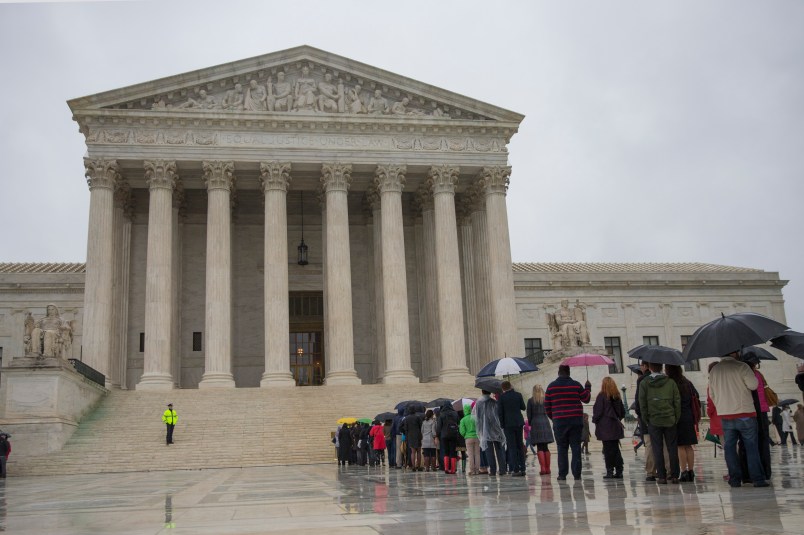If you’re looking for a silver lining to this morning’s ruling dealing a major blow to Obamacare (or rather a major blow to people getting subsidized policies in the states that didn’t adopt exchanges), look to the full DC Circuit Court. Given its present make-up (helped along mightily by breaking the filibuster logjam) it seems highly, highly likely that the full DC Circuit will reverse this ruling. The problem is that the question then moves to the Supreme Court, which seems quite likely – given recent decisions – to turn it back again to some version of today’s decision. In other words, at some point in the future it seems quite likely that the Supreme Court will gets its opportunity to gut the bill.
I say ‘corruption’ in the headline above because there is a point after which activist partisanship becomes so extreme that it amounts to corruption, in some ways more damaging than the venal or monetary corruption we normally imagine when we use the word. Corruption, in its original meaning, refers to rot, remember. And that is what we have here in spades.
The three judge panel has looked at a single clause which on its face does refer to exchanges set up by states. But to draw the conclusion it has, in this restrictive sense, you have to ignore the entirety of the rest of the statute, which clearly looks to a system in which the same subsidy regime would operate regardless of who set up the exchange. This is clear explicitly at some points and implicitly throughout. You also have the clear intent – stated now but more importantly stated by all at the time – that the law was intended to have the same subsidy regime for all exchanges.
Any suggestion that the law was intended to do anything else is absurd on its face.
But the two judges ruling in the majority in this case are essentially saying, “Who cares? You should have written this one sentence more clearly. End of story.” And there’s one tenet of statutory construction that says that’s all you have to do. There are numerous others that point in the other direction.
As David says, maybe it is the Mother of All Drafting Errors, though I think you only get to that conclusion if you assume the judges enter the question as advocates against the law. Alas, that seems to be the case.
The subsidies for Americans in 36 states now look clearly to be at the tender mercies of the conservative majority on the Supreme Court. Now unless SCOTUS chooses to make what would clearly be an activist partisan decision of a pretty high order, all will be fine. But, c’mon, look who we’re talking about.
It’s only fair to say that John Roberts surprised everyone two years ago when he sided with the Court’s liberal wing in upholding the individual mandate, viewed as a tax. But the 5 now have all they need to do major damage to the law.






